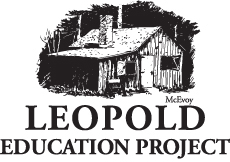The Leopold Education Project
go.ncsu.edu/readext?337124
en Español / em Português
El inglés es el idioma de control de esta página. En la medida en que haya algún conflicto entre la traducción al inglés y la traducción, el inglés prevalece.
Al hacer clic en el enlace de traducción se activa un servicio de traducción gratuito para convertir la página al español. Al igual que con cualquier traducción por Internet, la conversión no es sensible al contexto y puede que no traduzca el texto en su significado original. NC State Extension no garantiza la exactitud del texto traducido. Por favor, tenga en cuenta que algunas aplicaciones y/o servicios pueden no funcionar como se espera cuando se traducen.
Português
Inglês é o idioma de controle desta página. Na medida que haja algum conflito entre o texto original em Inglês e a tradução, o Inglês prevalece.
Ao clicar no link de tradução, um serviço gratuito de tradução será ativado para converter a página para o Português. Como em qualquer tradução pela internet, a conversão não é sensivel ao contexto e pode não ocorrer a tradução para o significado orginal. O serviço de Extensão da Carolina do Norte (NC State Extension) não garante a exatidão do texto traduzido. Por favor, observe que algumas funções ou serviços podem não funcionar como esperado após a tradução.
English
English is the controlling language of this page. To the extent there is any conflict between the English text and the translation, English controls.
Clicking on the translation link activates a free translation service to convert the page to Spanish. As with any Internet translation, the conversion is not context-sensitive and may not translate the text to its original meaning. NC State Extension does not guarantee the accuracy of the translated text. Please note that some applications and/or services may not function as expected when translated.
Collapse ▲ Increasing urbanization, growing use of electronic devices and other indirect ways of experiencing our natural environment increasingly disconnects us from the natural world, such as a farm, that sustains us daily. LEP is a program to help people reconnect to the land.
Increasing urbanization, growing use of electronic devices and other indirect ways of experiencing our natural environment increasingly disconnects us from the natural world, such as a farm, that sustains us daily. LEP is a program to help people reconnect to the land.
The Leopold Education Project (LEP) is an innovative, interdisciplinary conservation and environmental education curriculum based on the essays in A Sand County Almanac written by Aldo Leopold. Originally created by a Wisconsin high school science teacher, LEP uses Aldo Leopold’s writings as a springboard for engaging students in natural science and literature curriculum.
Through reading about Leopold’s recorded discoveries and participating in meaningful activities, students will expand their awareness and appreciation of nature and their ecological understandings based on Aldo Leopold’s “Land Ethic.” The “Land Ethic’s” objective is to teach the student to see the land, to understand what he sees, and enjoy what he understands.” – Aldo Leopold.
LEP is mainly for use by teachers, although other educational groups and private citizens can benefit from the materials. One major premise of the LEP is that Leopold’s writings are both sound science and excellent literature, and that they can be used for meaningful conservation education. By brining students into direct contact with the land and posing questions that employ their critical thinking skills, LEP gives citizens the background to reach decisions based on a land ethic.
The Leopold Education Project has an assortment of activities for teachers and non-formal educators to help bring Leopold into their lessons and activities. Taking an LEP Educator Workshop you can attain these activities. For more information or to schedule LEP training for your school, organization, group or other, please contact Robert J. Hawk at 586-4009 or 488-3848. You can also email Robert at “robert_hawk@ncsu.edu.”




